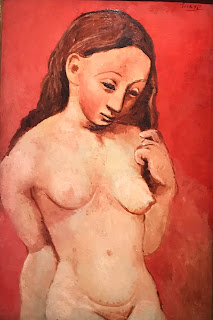I have got to admit it! I am addicted to Scrabble on my Ipad. Hours seem to go by when of course I should be doing other things. If you have the game you have probably discovered too that your virtual partner cheats badly with words that do not exist and even words that if you ask for if in a predicament are not, in my Larousse either. So wandering along toward the Odeon the other day, the rain was beginning and I was next to the Cluny Museum which is medieval. It’s a museum I enjoy and have discovered that much of this art - be it religious or not along with the sculpture is often without the incredible detail that you find for instance in the Renaissance. There was an exhibition which was about to end and I had intended going before the last day, but what better moment that now with the rain spitting and a ghastly wind blowing.
«Art of Game and Game in Art» «Art du jeu, jeu dans l’Art» - from Babylone to the Medieval Occident. Before my addiction to Scrabble, I have never been taken up by games or gambling of any kind. What was I about to discover?
Above all, a beauty in the pawns or games which perhaps we do not find today. Ivory, sometimes stone, bone or wood and preserved to perfection. No doubt at all that the games could still be played today with these original pieces.
The «senet» was very popular during the New Empire (1500-1000 BC). The pawns are in bone and from what they have detected, it was a game that could probably be played by 2 or up to 7 people. If you won, you went to heaven which is a play on words of «senet» meaning «passage». One player is left and if the rules are well known it is because of the «passage» to another world. Many games revolved around this theme. But look at that blue. Could it be the original colour?
 |
| The Senet 1390-1353 BC |
The rules of many of these early games seem to me rather complicated but then of course the translations may not be easy to do either.
 |
| Dog and Jackal 1814-1805 BC |
This was the poster
for the exhibition. Very eye catching.
It’s a game called the
58 holes and also called the Dog and Jackal Game. It was introduced into
Egypt at the end of the third millenium and was successful during the
middle ages and the New Empire before disappearing. Two players but once
again the method is not easy to follow, but I guess we wont be playing it.
 |
| From Belgium around 1470-1480 |
Cards were introduced into Europe at the end of the 14th century and became popular very rapidly. Although most were rectangular, many were also round or square. It was in the 15th century in France that the symbols we know on cards were created. Something perhaps we hadn’t thought about either is that cards introduced a more ludic game, not as noisy as games with pawns although later, dice are introduced for games of chance.
 |
| Northern Italy around 15th C |
This Chess board is quite
remarkable. From th 5th or 6th century ot comes from India and around
the borders are carvings of elephants, cavalry.....It was a game that
was first of all played with four people and then two. The Arabs passed
it onto to the Persans and then it came into Europe at the end of the
10th century
Some of the pawns were really quite beautiful as you can hopefully see.
 |
| Ivory Islamic Chess pawn - Adam and Eve 10th or 11th |
 |
| English Ivory Chess Pawn 12th |
 |
| Charlemagne Chess Game end 11th |
 |
| Animal Chess pawns Egypte New Empire and 26th Dynasty |
I’ll certainly be back on scrabble but it was a very entertaining hour.
As games go, there was another artist I discovered at the Swedish Institute, Martin Medbo. A ceramic artist with rather a destructive approach. He says it himself. You like his work or you don't. I do not like cut up bodies so went through this part of the exhibition very fast. In the main salon of the Hotel there are the Schoolyard Monkeys which are suppose to conjure up images of situations we lived in the school yard, playground or kindergarten. Some are related to violence and power or loyalty and pressure which is bought to bare on the children around us - whether we like it or not. Children can be cruel, like adults and I guess many of those situations are installed in our memories for the rest of our lives. But I didn’t really see anything which disturbed me.
Only children's or adult games......
















Commentaires